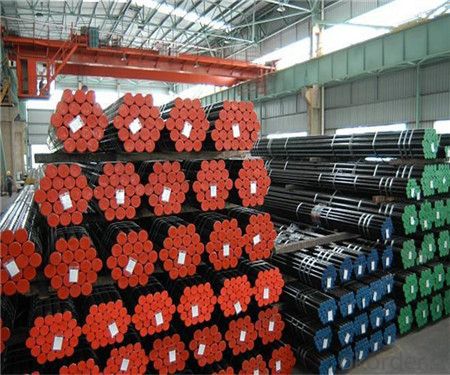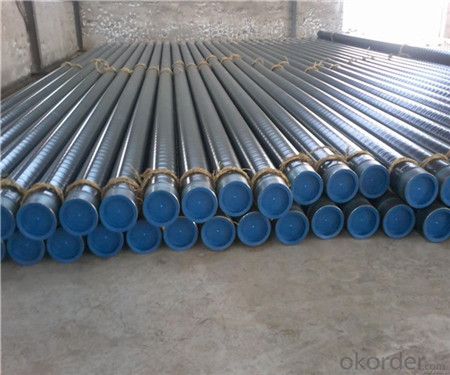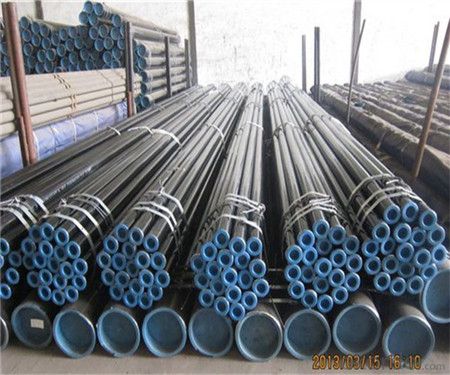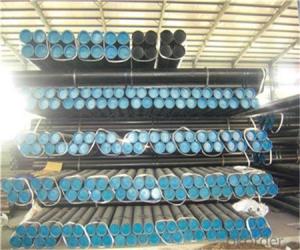Seamless Steel Pipe DIN17175/EN10216-2 China Supplier
- Loading Port:
- Tianjin
- Payment Terms:
- TT OR LC
- Min Order Qty:
- 20 m.t.
- Supply Capability:
- 9000 m.t./month
OKorder Service Pledge
OKorder Financial Service
You Might Also Like
Product Description:
1、Structure of Seamless Steel Pipe DIN17175/EN10216-2:
Seamless pipe is formed by drawing a solid billet over a piercing rod to create the hollow shell. As the manufacturing process does not include any welding, seamless pipes are perceived to be stronger and more reliable. Historically seamless pipe was regarded as withstanding pressure better than other types.
Standard: DIN17175/EN10216-2: Heat-resisting seamless steel tube for boiler
● Application: To be used for the manufacturing of boiler.
● Steel Grade: St35.8, St45.8, 15Mo3, 195GH, P235GH, P265GH, 20MnNb6, 16Mo3.
2、Main Features of Seamless Steel Pipe DIN17175/EN10216-2:
• High manufacturing accuracy
• High strength
• Small inertia resistance
• Strong heat dissipation ability
• Good visual effect
• Reasonable price
3、Seamless Steel Pipe DIN17175/EN10216-2Specification:
Standard | GB, DIN, ASTM ASTM A106-2006, ASTM A53-2007 |
Grade | 10#-45#, 16Mn 10#, 20#, 45#, 16Mn |
Thickness | 8 - 33 mm |
Section Shape | Round |
Outer Diameter | 133 - 219 mm |
Place of Origin | Shandong, China (Mainland) |
Secondary Or Not | Non-secondary |
Application | Hydraulic Pipe |
Technique | Cold Drawn |
Certification | API |
Surface Treatment | factory state or painted black |
Special Pipe | API Pipe |
Alloy Or Not | Non-alloy |
Length | 5-12M |
Outer Diameter | 21.3-610mm |
Grade | 20#, 45#, Q345, API J55, API K55, API L80, API N80, API P110, A53B |
Standard | ASME, ASTM |
1) Material:20#(ASTM A 106/A53 GRB.API5LGRB,GB),45#,16Mn,10#.
2) Specification range:OD:21.3-610mm,WT:6-70mm,length:6-12m or according to the requirement of clients.
3) Excutive standards:GB,ASME API5L.ASTM A 106/A53,Despite of the above standards,we can also supply seamless steel pipe with standard of DIN,JIS,and so on,and also develop new products according to the requirements of our clients!
4) Surface:black lacquered,varnish coating or galvanized.
5) Ends:Beveled or square cut,plastic capped,painted.
6) Packing:bundles wrapped with strong steel strip.
4、Packaging & Delivery
Packaging Details: | seaworthy package,bundles wrapped with strong steel strip |
Delivery Detail: | 15-30days after received 30%TT |
5、FAQ of Seamless Steel Pipe DIN17175/EN10216-2:
①How is the quality of your products?
Our products are manufactured strictly according to national and internaional standard, and we take a test
on every pipe before delivered out. If you want see our quality certifications and all kinds of testing report, please just ask us for it.
Guaranteed: If products’ quality don’t accord to discription as we give or the promise before you place order, we promise 100% refund.
②How about price
Yes, we are factory and be able to give you lowest price below market one, and we have a policy that “ for saving time and absolutely honest business attitude, we quote as lowest as possible for any customer, and discount can be given according to quantity”,if you like bargain and factory price is not low enough as you think, just don’t waste your time.Please trust the quotation we would give you, it is professional one.
③Why should you chose us?
Chose happens because of quality, then price, We can give you both.Additionally, we can also offer professional products inquiry, products knowledge train(for agents), smooth goods delivery, exellent customer solution proposals.Our service formula: good quality+good price+good service=customer’s trust
SGS test is available, customer inspection before shipping is welcome, third party inspection is no problem.
● Professional teams ensure a high efficiency of your purchase
▲ Professional sales team
▲ Professional engineering and technology team
▲ Professional exportation and contract processing/management team
▲ Professional cooperators and partners
6、Seamless Pipe DIN17175/EN10216-2 Images:



- Q:Can steel pipes be bent or shaped to meet specific requirements?
- Yes, steel pipes can be bent or shaped to meet specific requirements through various techniques such as hot bending, cold bending, or using specialized machinery like pipe benders.
- Q:Can steel pipes be used for underground cable conduits?
- Yes, steel pipes can be used for underground cable conduits.
- Q:Galvanized steel pipe in addition to good rust resistance, what are the advantages?
- It has the characteristics of corrosion resistance and wear resistance, so it can be used longer;
- Q:What are low-pressure carbon steel tubes?
- It's pressure levelThe design pressure (P) of pressure vessel is divided into four pressure levels: low voltage, medium pressure, high pressure and extra high pressure:(1) low voltage: Code L, 0.1MPa is less than or equal to p<1.6MPa(2) MP: Code M, 1.6MPa is less than or equal to p<10.0MPa(3) high voltage: Code H, 10.0MPa is less than or equal to p<100.0MPa(4) high voltage: Code U, P = 100.0MPa
- Q:What is the maximum pressure that steel pipes can handle?
- The maximum pressure that steel pipes can handle depends on various factors such as the grade and thickness of the steel, the diameter of the pipe, and the intended application. However, steel pipes are known for their high strength and durability, allowing them to withstand high pressure conditions. In general, steel pipes can handle pressures ranging from a few hundred PSI (pounds per square inch) to several thousand PSI, depending on the specific specifications and design considerations. It is crucial to consult engineering standards, industry guidelines, and relevant experts to determine the appropriate maximum pressure for a specific steel pipe.
- Q:Can steel pipes be used for pharmaceutical manufacturing plants?
- Yes, steel pipes can be used for pharmaceutical manufacturing plants. Steel pipes are known for their durability, strength, and resistance to corrosion, making them suitable for transporting various fluids and chemicals used in pharmaceutical production. Additionally, steel pipes can be easily sanitized and meet industry standards for cleanliness, making them a reliable choice for pharmaceutical manufacturing facilities.
- Q:What is the difference between seamless steel pipes and seamless alloy steel pipes?
- The main difference between seamless steel pipes and seamless alloy steel pipes lies in their composition. Seamless steel pipes are made from carbon steel, which is primarily composed of iron and carbon. On the other hand, seamless alloy steel pipes are made from a combination of carbon steel and various alloying elements such as chromium, nickel, or molybdenum. These alloying elements enhance the properties of the steel, making it more resistant to corrosion, heat, and pressure. They also provide improved strength and durability, making alloy steel pipes suitable for applications that require high performance and reliability. In summary, while both seamless steel pipes and seamless alloy steel pipes are used for various industrial applications, alloy steel pipes offer superior performance due to their alloying elements, making them more suitable for demanding conditions.
- Q:What are the common welding techniques used for steel pipes?
- The common welding techniques used for steel pipes include shielded metal arc welding (SMAW), gas tungsten arc welding (GTAW), gas metal arc welding (GMAW), and flux-cored arc welding (FCAW). These techniques are widely used in various industries for joining steel pipes due to their efficiency, reliability, and ability to produce strong and durable welds.
- Q:What are the common uses of steel pipes in construction?
- Steel pipes are commonly used in construction for various purposes due to their durability and strength. One of the most common uses of steel pipes in construction is for plumbing systems. Steel pipes are often used to carry water, gas, and other fluids throughout a building. They are preferred over other materials due to their resistance to corrosion and ability to withstand high pressure. Another common use of steel pipes in construction is for structural support. Steel pipes are often used as columns or beams to provide structural integrity to buildings. They can support heavy loads and provide stability to structures, making them a popular choice in the construction industry. Steel pipes are also commonly used in the construction of bridges and highways. They are used for creating strong and durable bridge supports, guardrails, and signposts. Steel pipes are able to withstand extreme weather conditions and heavy traffic, making them a reliable choice for infrastructure projects. Furthermore, steel pipes are used for underground utilities such as sewer and drainage systems. They provide a strong and long-lasting solution for transporting wastewater and preventing leaks. Steel pipes are also used in the construction of underground tunnels and pipelines. In addition to these common uses, steel pipes are also utilized in construction for fencing, scaffolding, and handrails. They are chosen for their strength, versatility, and ability to withstand harsh environmental conditions. Overall, steel pipes are an essential component in construction due to their numerous advantages. Their durability, strength, and resistance to corrosion make them a reliable choice for various applications in the construction industry.
- Q:How are steel pipes used in the textile industry?
- Steel pipes are used in the textile industry for various purposes, including the transportation of water, steam, and chemicals, as well as for the distribution of compressed air. They are also used in the construction of machinery and equipment, such as dyeing machines and fabric stretching frames. Additionally, steel pipes are utilized for the installation of heating and cooling systems in textile factories.
1. Manufacturer Overview |
|
|---|---|
| Location | |
| Year Established | |
| Annual Output Value | |
| Main Markets | |
| Company Certifications | |
2. Manufacturer Certificates |
|
|---|---|
| a) Certification Name | |
| Range | |
| Reference | |
| Validity Period | |
3. Manufacturer Capability |
|
|---|---|
| a)Trade Capacity | |
| Nearest Port | |
| Export Percentage | |
| No.of Employees in Trade Department | |
| Language Spoken: | |
| b)Factory Information | |
| Factory Size: | |
| No. of Production Lines | |
| Contract Manufacturing | |
| Product Price Range | |
Send your message to us
Seamless Steel Pipe DIN17175/EN10216-2 China Supplier
- Loading Port:
- Tianjin
- Payment Terms:
- TT OR LC
- Min Order Qty:
- 20 m.t.
- Supply Capability:
- 9000 m.t./month
OKorder Service Pledge
OKorder Financial Service
Similar products
New products
Hot products
Related keywords






























